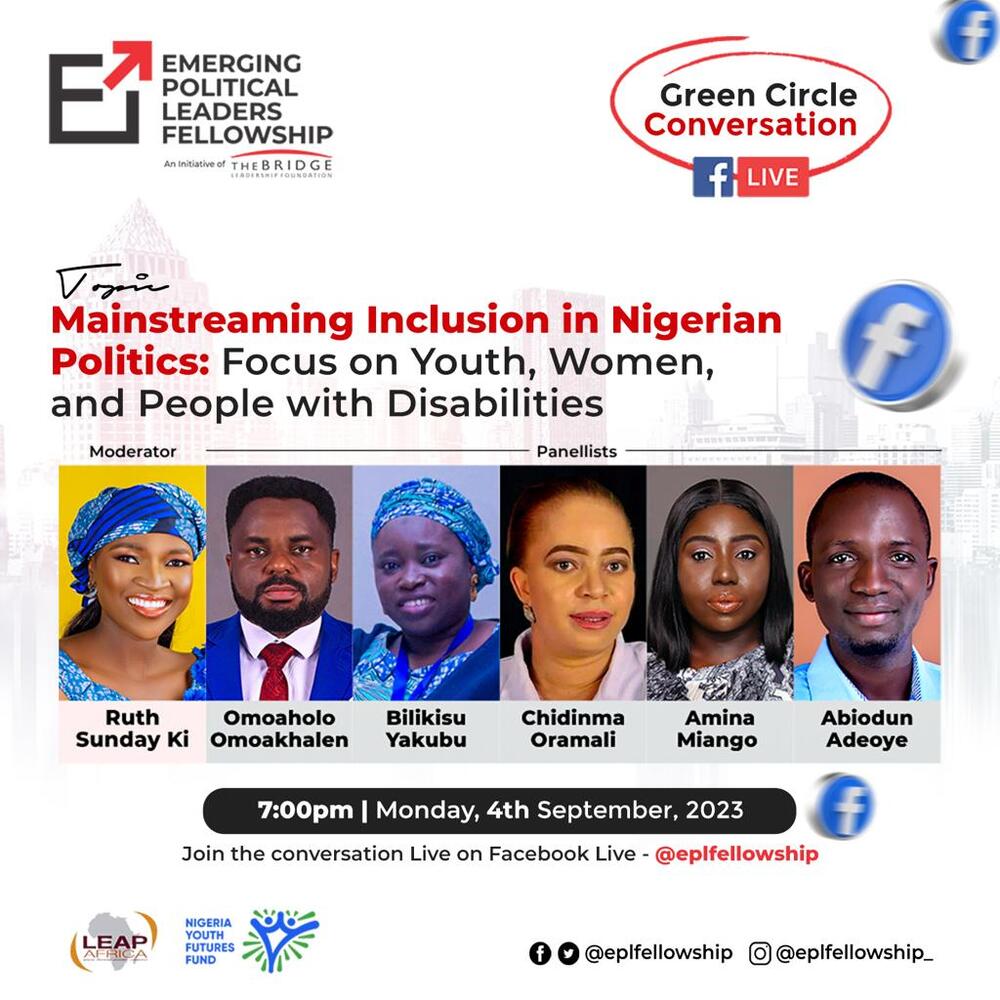On Monday, September 4, 2023, a dynamic Facebook Live Conversation took place, addressing the pivotal topic: “Mainstreaming Inclusion in Nigerian Politics: Focus on Youth, Women, and People with Disabilities.” This engaging discourse brought together a total of 10 participants, encompassing 5 speakers, 4 attentive listeners, and 1 co-host. Our esteemed panel featured Ruth Sunday Ki as the Moderator, alongside Omoaholo Omokhalen, Bilikisu Yakubu, Chidimma Oramali, Amina Miango, and Abiodun Adeoye.
The core objectives of this enlightening session were as follows:
-To actively promote the participation and representation of marginalized groups, including youth, women, and people with disabilities, within the diverse tapestry of Nigerian politics, spanning all echelons of governance.
-To stimulate and facilitate the meaningful involvement of youth, women, and people with disabilities in the democratic process, nurturing a culture of active political engagement and civic responsibility.
-To offer essential support, resources, and opportunities that enable the comprehensive engagement of youth, women, and people with disabilities in political activities, ranging from contesting for political offices to influencing decision-making processes and advocating for their rights and interests.
-To ardently advocate for and actively participate in the development and implementation of policies and reforms tailored to address the unique needs and challenges faced by these marginalized groups within the political sphere.
-To elevate awareness and facilitate a deeper understanding of the critical importance of inclusion and diversity in Nigerian politics. This outreach extends to political stakeholders, the general public, and influential decision-makers.
During this illuminating session, participants unveiled substantial achievements and noteworthy insights. A significant focal point was the exploration of why these three distinct groups, youth, women, and people with disabilities who continue to face underrepresentation in Nigerian politics. It delved into the barriers they encounter and the shared responsibility required to ensure their full and active participation within this context.
Nevertheless, the discussion unearthed some compelling lessons:
-The marginalization of these groups is not solely attributable to one party; rather, it is a shared culpability stemming from factors such as poverty, entrenched cultural stereotypes, and what can be termed as political illiteracy.
Notably, it was observed that despite women constituting a significant portion of the voting population, they often encounter resistance, particularly from their own gender, when they seek political office. This bias can hinder their progress.
-The youth segment faces challenges tied to short-term considerations, including the allure of immediate benefits, often referred to as “stomach infrastructure.” This leads to complex dynamics where fellow youth may not support independent candidates who could represent their interests.
Despite these challenges, the session proved to be a resounding success, yielding valuable recommendations for the way forward. To enhance the impact of events like the EPLF Green Circle sessions, it is proposed that greater visibility and reach be achieved through strategic promotion on the platforms of the Bridge Leadership Foundation’s social media. This strategic move promises to increase traction and augment the overall influence and effectiveness of these sessions in the pursuit of a more inclusive and vibrant Nigerian political landscape.

